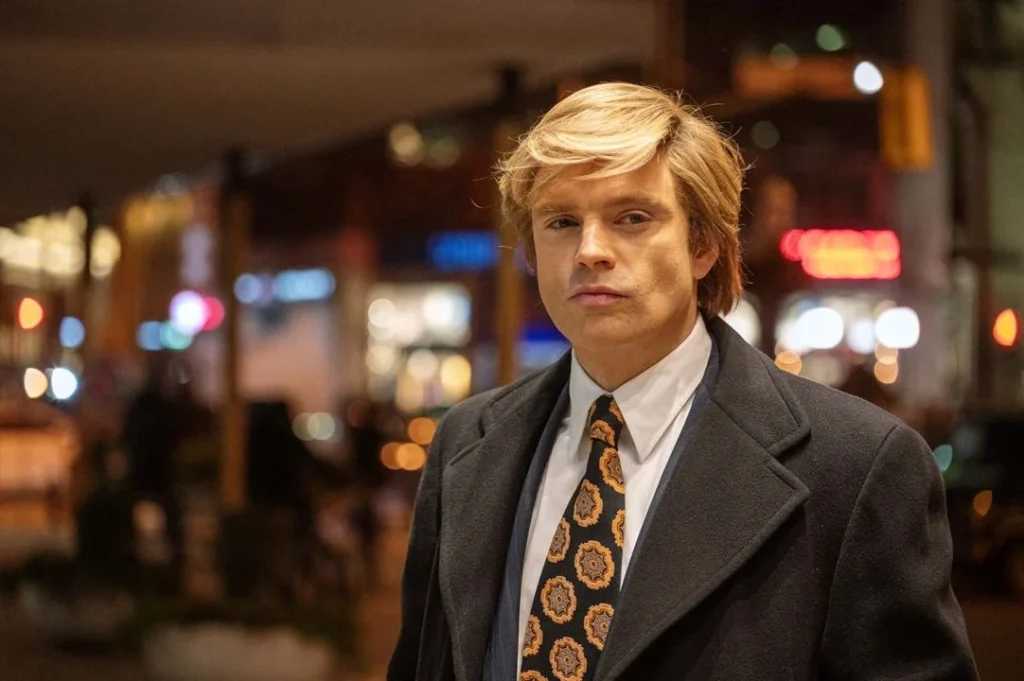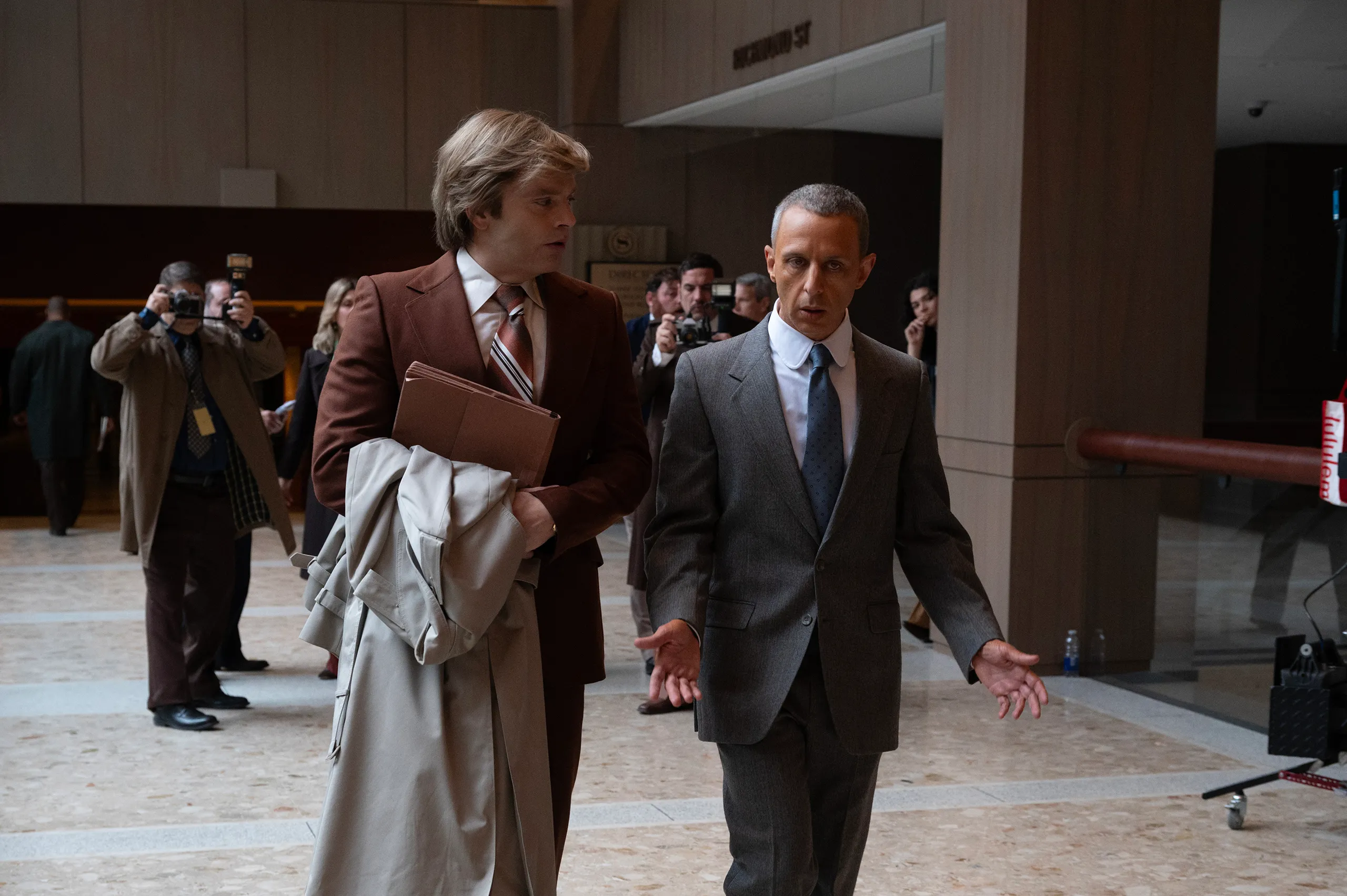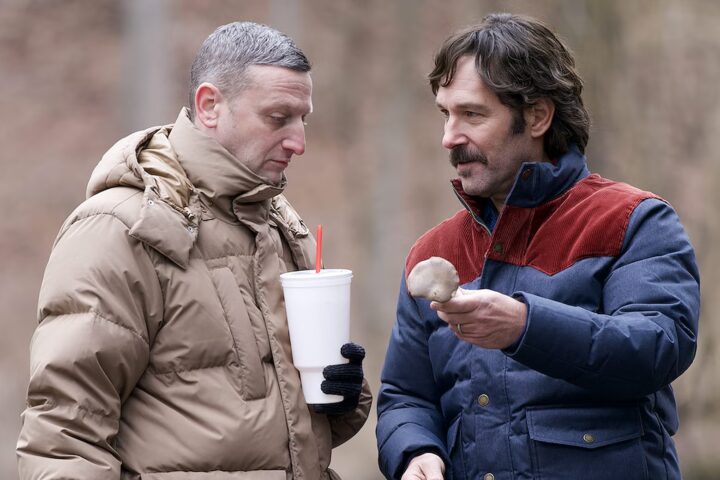How do you make an honest film about Donald Trump when an election is looming and any depiction risks being seen as partisan? Trump is already larger than life—an endlessly debated, dissected and debunked figure. But early in The Apprentice, Ali Abassi’s can’t-look-away tale of a young Trump’s rise in New York’s cutthroat real estate scene, Abassi finds a way in. Enter infamous lawyer Roy Cohn, who will become the fledgling Trump’s merciless mentor, instilling three ironclad rules for winning: 1) attack, attack, attack, 2) admit nothing, deny everything, and 3) always claim victory, never show defeat. Recognize that playbook?
Upon the film’s Cannes debut earlier this year, Iranian-Danish filmmaker Abassi (Border, Holy Spider) couldn’t find a distributor willing to face the barrage of surefire controversy (and legal threats from Trump’s camp) as well as an audience tightrope: likely alienating liberals who have had their fill and conservatives assuming another hit piece. But his film isn’t a propagandist’s punchline. Instead, it pulls off something more impressive by rebuilding a character in considerable detail from one that’s already been fully deconstructed.
The Apprentice charts the rise of Trump’s Gordon Gekko-esque young tycoon, swimming in a shark tank stripped of ethics, and while frequently scathing it refuses to reduce Trump to a cartoon. Whether you loathe or love him, Abassi’s film (and star Sebastian Stan’s marvelous embodiment) is a surprisingly complex “inside baseball” portrait.
From Gabriel Sherman’s based-on-actual-events screenplay, Abassi mounts an engrossing deep dive on two men who are initially diametrically opposed—notorious, string pulling master puppeteer Cohn (Jeremy Strong), prosecutor of the Rosenbergs and defender of McCarthy, and the other, the unpolished wannabe Trump (Stan) desperate to crash the party. Trump tries to play the part, taking dates to exclusive clubs (“Anybody who’s anybody comes here”), until kingpin Cohn sizes him up: “You’re gorgeous. You’re a real thoroughbred.” And so began a symbiosis built on ego, power and mutual opportunism. Hint: it won’t end well.
Opening in the mid-1970s, Sherman and Abassi present the fledgling Trump playing the part of reluctant slumlord, trying to dodge the heat from the family’s infamous Fair Housing discrimination lawsuit. “They’re forcing us to rent to welfare cases!” he protests, as his real estate developer father Fred Trump (Martin Donavan) faces charges of racial profiling against Brooklyn’s Black tenants. Enter Cohn, the legal shark with no moral compass, using blackmail to get the case dismissed. Cohn lectures young Trump: “Fair Housing Act? Sounds like un-Fair Housing Act. Liberals want to spread our money around to deadbeats on welfare. They’re worse than Nazis.”

Cohn unlocks Trump’s drive and “fixes what others couldn’t” while father Fred lords over his sons, a patriarch whose approval they’re desperate to win. There’s Freddy (Charlie Carrick), the tragically outcast airline pilot and impatient Donald, hungry to “take New York and bring it back.” Donald’s meteoric rise begins with his first major project, the transformation of 42nd Street’s distressed Commodore Hotel into the Hyatt Grand Central, founder Jay Pritzker standing by as Cohn strong-arms a sweetheart tax break (scheme) to the tune of hundreds of millions. Next he’s out to develop what would become crown jewel Trump Tower (lavishly recreated here by production designer Aleks Marinkovich), clashing with New York mayor Ed Koch before an insult-laden TV interview: “Koch has no talent and moderate intelligence.” As we know, Trump was just warming up.
After Trump sweeps Czech model Ivana Zelníčková (Maria Bakalova) off her feet by pestering her with lavish gifts, cold realist Cohn demands an ironclad prenup: “Matrimony is a zero-sum game. Buyer beware!” But as Trump takes on high-stakes casino developments in Atlantic City, his marriage to Ivana viciously unravels. In a jaw-dropping scene that leads to sexual violence, Ivana gifts Donald a book about the G spot. Venomous barbs ensue: “I’m not attracted to you anymore. I feel weird touching those fake plastic tits.” Ivana gives as good as she gets: “Your face looks like an orange. You’re fat, ugly, bald and disgusting.”
It’s not just Ivana who faces Trump’s bravado. Cohn, once his indispensable mentor, is pushed to the side. As Trump’s wealth and ego rise his need for Roy dwindles. Cohn, who keeps his closeted sexuality largely hidden from New York society while entertaining friends like Roger Stone—here called the king of “dirty tricks”—is known for lavish parties (Warhol, Murdoch and Steinbrenner turn up) and for indulging in coke-fueled orgies that will force a tragic reckoning as the AIDS crisis hits hard.
Strong, ever the consummate actor, masterfully digs into Cohn’s professional and personal unraveling. In a brilliant Fifth Avenue sidewalk showdown, he confronts his now-famous former friend: “You’re the devil!” In a hell of a supporting turn, Strong gives his previously unsparing character a too-little, too-late humanity.
Stan (also terrific in this season’s A Different Man) could have easily gone for a satirical take on Trump—and who would blame him? But his richly evocative portrait of the early Trump as a mendacious, cocky striver with big ambitions and little substance is finely rendered. The actor nails Trump’s swaggering optimism and pushy chutzpah, a hustler with dreams always bigger than his reality (and credit). But as the film advances, so does the evolution of Stan’s performance, morphing into the Trump we recognize, fascinatingly capturing his distinctive gait, awkward vocal cadences, self-aggrandizing postures and exaggerated expressions.
On two occasions the star also gives depth to behaviors we know we shouldn’t empathize with. In a key scene, Stan allows his Trump to shed rare tears, while refusing comfort with a pointedly dismissive gesture—one of many of the actor’s small choices that deepen the performance and character. His performance is an uncanny embodiment and mark of one of our best actors, finally emerging in a role worthy of his talents.

At the same time, Bulgarian-born Maria Bakalova, Oscar-nominated for her splendid comedic turn in 2020’s Borat: Subsequent Moviefilm, brings intelligence and appeal to a woman keenly aware of her status as a “trophy wife” but refusing to be reduced to it, even when her husband forces her to smile for the cameras as he privately seethes that she treats him like “a business partner.”
As a portrait of immorality driving wild success, The Apprentice depicts Trump gleefully lying, cheating, playing the system and attempting to betray his own father with a winner-take-all credo: “There is no morality. No truth with a capital T. Nothing matters except winning.” While Abassi mounts his dark allilance between Cohn and Trump we can’t help but wonder what things might be like today if Trump hadn’t met Cohn. Just how different would America be? At one juncture, Reagan-era Trump is queried about poltical aspirations while considering a discarded Regan campaign slogan—Let’s Make America Great Again!—only to dismiss: “government is for losers.”
The film’s visual richness, thanks to DP Kasper Tuxen, vividly captures the gritty pre-cleanup New York of the 70s and 80s with a roving camera that soaks up the city with grainy texture (and its 80s sequences have a different, period appropriate digital, almost home video sheen), and composer Martin Dirkov heightens the tension with a haunting score bolstering the picture’s classical themes of greed, success and reversal of fortune. If you listen to a moment where the unlikely Roy catches the bouquet at the Trumps’ wedding, or another where Ivana and Donald sit quietly together on a private plane, or to the sobering final sequence—Dirkov’s score raises the film’s gravitas to something deadly serious and perhaps tragic.
The Apprentice is a seductive time capsule origin story, one that neither glosses over Trump’s calculations nor feels like an abject hatchet job. In its dark, ironic closing moments, it presents a twisted vision of the American Dream, Trump undergoing scalp reduction and liposuction while Cohn’s demise is underscored by a funereal performance of America (My Country, ’Tis of Thee). At the same time, Mar-a-Lago is all but fumigated after Cohn’s final visit, as one man rises to fame while the other goes to his grave. This is provocative stuff, and one of the year’s most entertaining films.
3 1/2 stars



